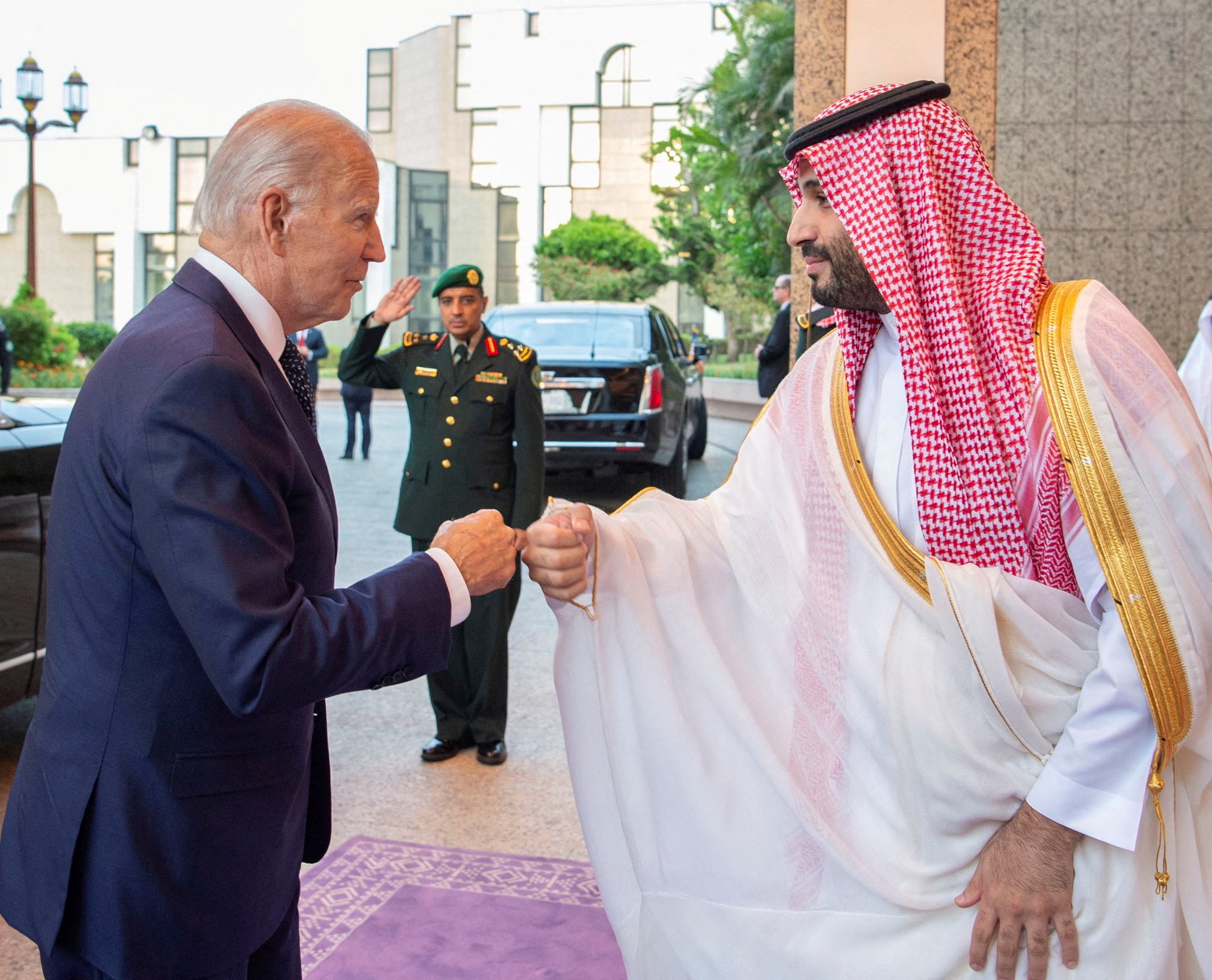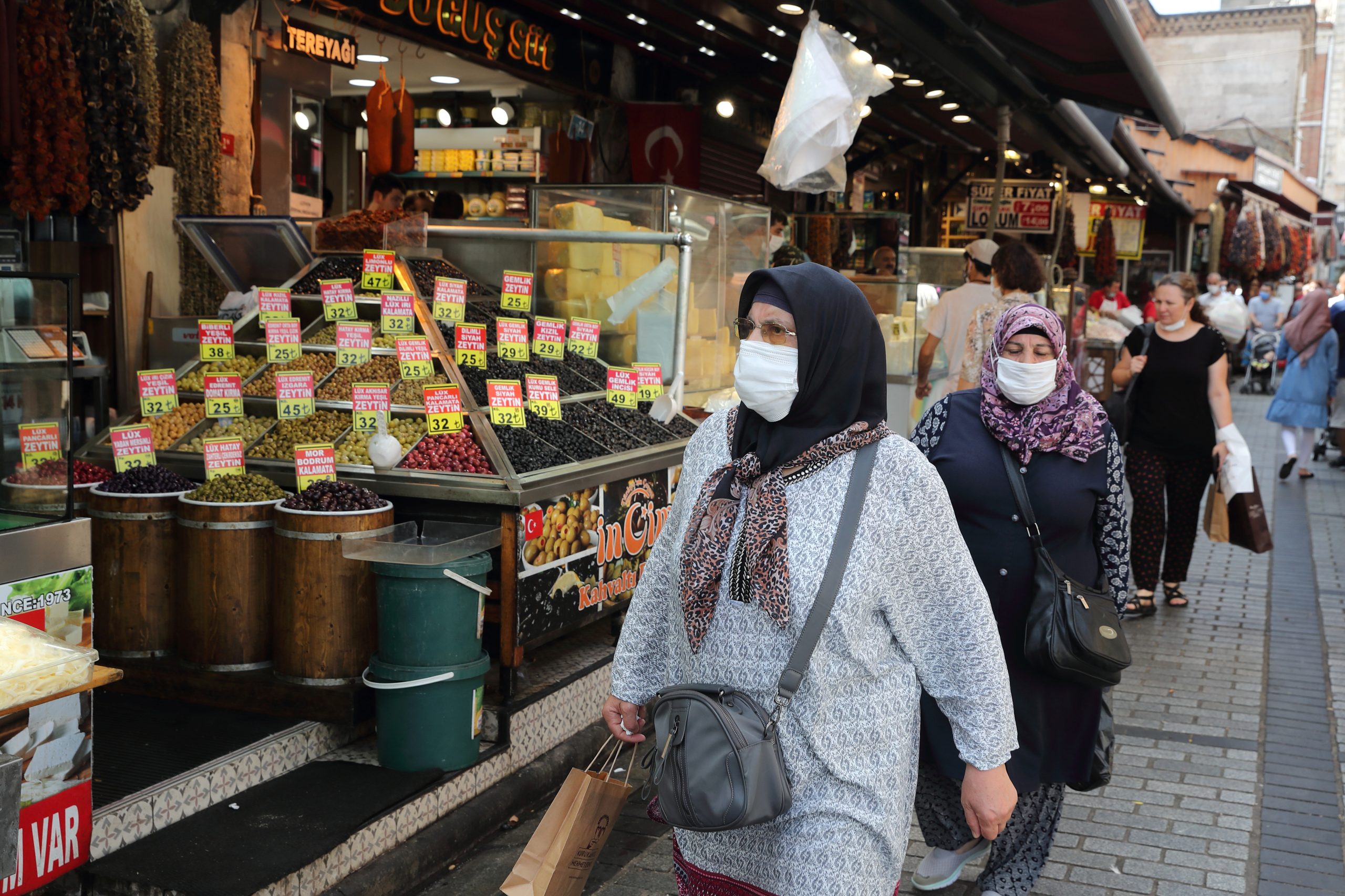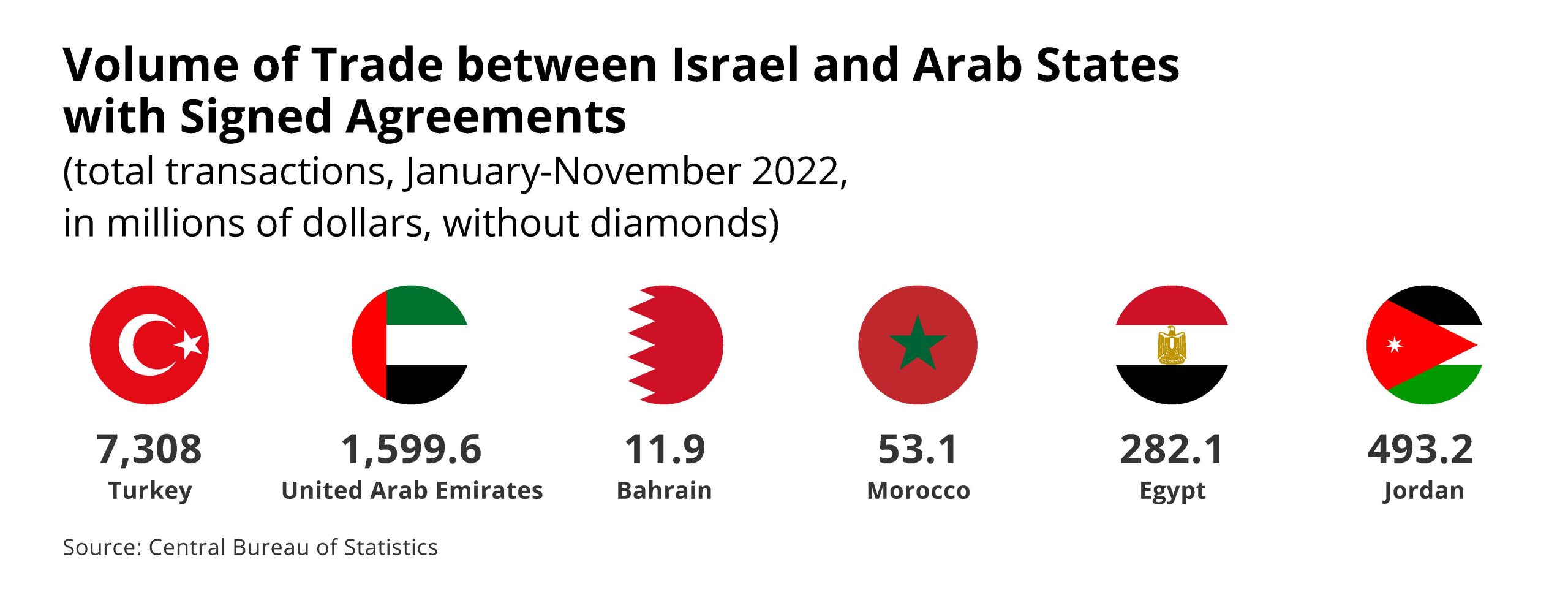The Regional Arena: “Having it Both Ways”
Yoel Guzansky, Gallia Lindenstrauss, Ofir Winter, Remi Daniel, Morr Link, Marta Furlan, and Oded Eran
The Regional Arena: “Having it Both Ways”
Yoel Guzansky, Gallia Lindenstrauss, Ofir Winter, Remi Daniel, Morr Link, Marta Furlan, and Oded Eran
Summary chart
Current Situation
States’ respective considerations on willingness to advance relations with Israel · Core components determine ability to progress
Current Israeli Strategy
Strengthen normalized relations and leverage the Abraham Accords toward additional relationships · Cultivate quiet relations with additional countries
Israel’s Strategic Gap
Conception that “what was is necessarily what will be” – positive linearity · Incomplete acknowledgment that the Palestinian issue impacts relations · Challenges ahead that are beyond Israel’s control
Strategic Considerations
Palestinian issue and possible escalation in Jerusalem · Rhetoric and activity from new Israeli government · Level of support of the Biden administration, which has decisive influence on advancing relations · Iran as an actor that seeks to drive a wedge between Israel and its new partners · Inherent tension between normalization with “new” and “veteran” countries
Recommended Strategy
Devote energy to both “new” and “veteran” countries and adjust existing policies · Examine advance of diplomatic formulas in addition to Abraham Accords, e.g., advance a new Saudi/Arab Peace Initiative, to maintain momentum
Recommended Action
Encourage greater US investment to advance relations, while highlighting the importance to US interests · Temper the pejorative discourse · Formulate a regional policy, preferably with the PA, Jordan, and Saudi Arabia, to alleviate religious tension in Jerusalem · Strengthen the peace agreements’ “soft” achievements, especially for the younger generations in countries at peace with Israel · Remove bureaucratic barriers · Appoint a “normalization project director” to coordinate all Israeli activities
Regional Trends
“Strategic hedging” is a central feature of relations between Middle East countries and between them and the great powers. In the first sphere, between the states of the region, a “détente” continues that does not necessarily match the traditional division into opposing camps. In the second sphere, the states of the region seek to maximize their inherent value and diversify their political-military mainstays, including in a manner that challenges their relations with the United States.
With regard to intra-regional relations, there has been a temporary lull in tensions and conflicts, above all the war in Yemen, where the sides reached a fragile but significant ceasefire. Other positive aspects from Israel’s perspective are the progressive deepening of the Abraham Accords; the rapprochement with Turkey; the weakening of political Islamic organizations in the region, chiefly the Muslim Brotherhood; and the growing importance of climate and environmental issues that require inter-state cooperation. At the same time, economic gaps between the wealthy economies of the region have deepened, especially between the oil and gas producers and the poor oil-importing economies, whose economic situation has worsened with the war in Ukraine. Some are defined as failed states, including Lebanon, Jordan, Syria, and Yemen. The economic challenges are a central catalyst for rapprochement between regional actors such as Egypt and Qatar or even Turkey and the United Arab Emirates and Saudi Arabia, and this is a prominent feature of the regional “détente” process.
The growing economic power of the Gulf states has increased their inherent value (as perceived by them and others ) and has led them to adopt a more independent foreign policy and attempt to avoid choosing sides in the competition between the great powers. This includes policies that are not always aligned with those of the United States, especially with respect to the energy sector and ties with China. The visit to Saudi Arabia by US President Joe Biden in July 2022, which was meant to “reset” relations with the Kingdom and with the Arab world as whole and launch the United States’ return to leadership role in the region, has not changed the trend so far. Indeed, many countries in the region question American willingness to stand by their side, especially vis-à-vis Iran, and believe that there has been a change in the global priorities of their main ally.
In this context, some countries have tried to stabilize their relations with Iran, which is central in their threat perception. The United Arab Emirates and Kuwait, for example, have tightened their diplomatic and economic relations with Tehran, while Saudi Arabia continues to try to maintain an open channel of communication with it. While the Saudis do not expect that these efforts will resolve their deep, longstanding disputes with Iran, they strive to reduce tensions and build a basis for limited cooperation, to the extent possible.
These trends have implications for Israel, especially for its interest in establishing an anti-Iran camp and advancing the normalization process with its neighbors. Tense relations with the United States could push the Gulf states closer to Iran, but also increase their military reliance on Israel. The United States’ standing in the region will also influence the ability to maintain the achievements of the Abraham Accords and to attract additional countries to the process, chiefly Saudi Arabia. The latter is the most important Arab country among those that do not yet have diplomatic ties with Israel.

The visit to Saudi Arabia by US President Joe Biden, which was meant to “reset” relations, has so far not changed the trend. The cold handshake between President Biden and Crown Prince Mohammed bin Salman, July 2022
Photo: Bandar Algaloud/Courtesy of Saudi Royal Court/Handout via REUTERS
Developments in Relevant Regional Actors
The year 2022 was marked by a deep economic crisis in the energy-importing countries and increased dependence on external aid, especially from the Gulf states. The cumulative effect of the COVID-19 pandemic, the war in Ukraine, the slowdown in global economic activity, and the climate crisis could have adverse social consequences and generate political shockwaves in the oil-importing countries, further amplifying the divide between them and the oil-producing countries. The latter are also gradually shifting the nature of their investments, for example in Egypt, where investments include the acquisition of state assets.
In Egypt the economic challenges have intensified due to the war in Ukraine, in part following the rising prices of imported grains and the drop in tourism from Russia and Ukraine. The economic crisis is manifested in various negative indicators, including annual inflation of more than 20 percent, a sharp devaluation of the Egyptian pound, and dwindling foreign exchange reserves. At the same time, Egypt recorded an increase in gas export profits and a record amount in royalties from Suez Canal fees. Egypt is coping with the economic difficulty – which could also have negative political and social consequences – through a support package approved in December 2022 by the International Monetary Fund. A second strategy involves attempting to secure more investment and funding from its Gulf allies, chiefly Saudi Arabia, the United Arab Emirates, and Qatar, which has accelerated its rapprochement with Cairo over the past two years.
2022 was marked by a worsening of the economic crisis in Turkey and preparations for presidential and parliamentary elections scheduled for spring of 2023. To compensate for the negative impacts of inflation, several populist economic measures were enacted. In addition, the economic crisis was reflected in increasing opposition to the presence of Syrian refugees in Turkey. In the realm of foreign relations, the war in Ukraine demonstrated Turkey’s geostrategic importance and its ability to serve as mediator. On the other hand, Western indignation arose on a number of issues, including Turkey’s opposition to the accession of Finland and Sweden to NATO; meetings between Turkish President Recep Tayyip Erdogan and Russian President Vladimir Putin; and Turkey’s partial circumvention of the economic sanctions imposed on Russia. While there were breakthroughs in efforts to normalize relations between Turkey and some countries in the region, Turkey’s achievements fell short of Ankara’s expectations. Relations with Iran are also at a relative low point. Likewise noteworthy was the tension with Greece and its consequences for the quadrilateral relations between Turkey, the United States, Greece, and Cyprus: Ankara sees Athens’ increasing standing in Washington and its narrowed military gap with Greece in a negative light. Given the ongoing economic crisis, it is highly likely that Erdogan will try to divert public attention toward foreign affairs, in particular the tension with Greece and Cyprus, and the Kurdish arena.

The past year was marked by a worsening of the economic crisis in Turkey. A market in Istanbul
Photo: REUTERS/Murad Sezer
In Jordan, the pandemic, the war in Ukraine, and the slowdown in global economic activity together have worsened the economic situation. The tourism industry, one of the Kingdom’s main sources of income and employment, has recovered somewhat but has not yet returned to its pre-pandemic levels. Donor countries directed a significant portion of their donations over the past year to the refugees in Ukraine, decreasing the amounts allocated for sheltering the Syrian refugees, 1.3 million of whom live in Jordan. This has exacerbated the burden on the Jordanian state budget, where the ratio of public debt to GDP has reached worrying levels.
Unlike many other actors in the region, the Gulf states saw 2022 marked by an economic boom, mainly against the backdrop of the war in Ukraine and the resulting energy crisis, as well as by some states adopting a “zero problems” foreign policy. Thanks to its budget surplus, Saudi Arabia launched various large-scale reforms, some hinting of megalomania, and along with the United Arab Emirates and Qatar increased its aid to some of its poorer neighbors, in the hope of augmenting its regional influence. Saudi Arabia’s security situation has temporarily improved with the attainment of a fragile, de facto ceasefire with the Houthis in Yemen. While all sides are militarily fatigued, the Saudis need the ceasefire more than the Houthis. The weakness of the Presidential Council, which is preoccupied with internal struggles, strengthens the Houthis’ confidence that they can score additional achievements on the ground and in negotiations. Experience shows that the prospects of reaching a long-term political settlement are slim.
Eyeing his country’s ambitious Vision 2030, Mohammed bin Salman, the de facto ruler of Saudi Arabia, seeks to adopt a more independent foreign policy, consolidate the Kingdom’s leading standing in the Arab and Muslim world, and demonstrate leadership before he officially inherits the throne. Together with the other Gulf rulers, he seeks to maintain a delicate balance between the need to maintain close relations with the United States, their traditional ally, and the perceived benefits of cooperating with other actors, especially China. Indeed, although the Gulf countries see their relations with the United States as a central pillar of their security, they are troubled by the decline in US attention to the Middle East in general, and their security concerns in particular.
Finally, there is also a clear improvement in Qatar’s standing in the regional and international arenas. This development, especially following Doha’s reconciliation agreement with some of its Gulf neighbors, the tightening of its relations with the United States, and the consolidation of its role as a leading liquid natural gas (LNG) exporter, impacts fundamental Israeli interests beyond aid to the Gaza Strip.
Morocco continues to cope with the aftermath of the COVID-19 pandemic and the war in Ukraine, which are compounded by the worst drought in decades that in turn has harmed water and food security. The economic crisis is reflected inter alia in soaring inflation, price increases, and reduced growth, and has spurred social protests against the cost of living. The question of Western Sahara remains high on the agenda, with achievements in the past year in enlisting international support for Morocco’s claim to the area. Against this backdrop, the crisis in relations with Algeria is not expected to subside due to Algeria’s support for the separatist Polisario Front. The tension with Iran, accused by Rabat of regional subversion and of arming the Polisario, is also not expected to diminish.

There is a clear improvement in Qatar’s standing in the regional and international arenas. The Emir of Qatar with Argentinian soccer star Lionel Messi, World Cup 2022
Photo: Robert Michael/dpa via REUTERS
Normalization
The resilience of the relations between Israel and its neighbors will be tested by the measures that Israel’s new government might enact with respect to the Palestinians. Israel has a fundamental interest in maintaining and expanding the normalization trend. At the same time, the common assumption in Israel, that the process is characterized by linear continuity, is misguided. The process is fragile and reversible, and its future depends in part on challenges outside of Israel’s influence. Public opinion polls in the Gulf in the past year noted a decline in public support for normalization with Israel, especially for the Abraham Accords model. Against this background, it is important to consider the possibility that a withdrawal from the Abraham Accords by one country would have a domino effect and prompt other countries to cool their relations with Israel.
Along with the major importance of the Abraham Accords and the need to deepen and expand them, the agreements with Jordan and Egypt remain critical in terms of Israel’s strategic environment. The ramifications of the war in Ukraine have created new opportunities for expanding Israel-Egypt relations, particularly in the economic fields. Thus, the past year witnessed a series of positive developments: the opening of flight routes for Israeli tourism to Sharm el-Sheikh; the signing of a trilateral memorandum of understanding between Egypt, Israel, and the European Union aimed at encouraging European companies to search for natural gas in the Exclusive Economic Zones of Israel and Egypt, developing gas infrastructure, and exporting liquefied gas to Europe via Egypt; and the approval of an Israeli government program to promote economic relations with Egypt.
Water shortages are worsening due to the climate crisis, and without immediate solutions, Israel will face heightened pressure to increase the quantities that it supplies to Jordan. However, even the supply of water and natural gas will not reverse the trend of erosion in the relations between the two countries, especially overtly. While the dialogue between senior governmental officials was renewed following several years of disconnect, its continuation depends on the policies adopted by the new Israeli government, in particular vis-à-vis the Israeli-Palestinian conflict. Israel’s appropriation of the protection of the holy sites of Islam and Christianity also heightens criticism by King Abdullah, the Jordanian government, and the Jordanian parliament.
Turkish-Israeli relations experienced a breakthrough in 2022. In August, Israel and Turkey announced the normalization of relations and the return of ambassadors. Ankara expects concrete benefits from this development, particularly economic ones, as well as in terms of its relations with the United States. However, there is a gap between Turkey’s expectations and what Israel is able or willing to give Ankara. Furthermore, Jerusalem is trying to balance between normalization with Turkey and maintaining its good relations with Greece and Cyprus – a sensitive objective that becomes more complex with the rise in tension in the Eastern Mediterranean.
Many memoranda of understanding were signed with the Abraham Accords countries (some have not yet been implemented), as well as agreements in a variety of fields, including food and water security, medicine, and cyber; diplomatic missions were opened; highly publicized visits were held; and investments in Israel increased, especially by the United Arab Emirates. Hundreds of meetings took place between Israeli security establishment figures and their counterparts in the region, and Israeli defense exports to the Gulf countries and Morocco increased. Alongside the development of bilateral relations, multilateral relations have also scored significant achievements with the encouragement of the United States, especially in the security realm: Israel’s joining the US Central Command (CENTCOM) leads it to cooperate, even if not always directly, with armies of countries with which it does not have diplomatic relations. This development helps to increase cooperation in additional areas, although covertly.

To date, additional countries have not joined the Abraham Accords, and the agreements themselves have not generated any positive developments in the context of the Israeli-Palestinian conflict. Moreover, while the agreements will continue to exist separately from the Palestinian issue, the latter might negatively affect them, certainly if events of extreme violence occur Furthermore, various circumstances, and core processes could cool the relatively warm peace and hurt the chances of expanding them to additional countries, chiefly Saudi Arabia.
Saudi Arabia views relations with Israel as a strategic option, and is pursuing a “creeping normalization” of sorts with regard to Israel, mainly in the economic sphere. A possible warming of relations would likely assume a different model than the Abraham Accords, subject to circumstances and conditions inside and outside of the kingdom. Saudi Arabia will continue to emphasize, certainly formally, progress in the Israeli-Palestinian political process and will adhere to the Arab Peace Initiative as a basis for negotiations with Israel and as a condition for normalization, while maintaining the covert connections with Israel and gradually improving relations. An attempt to press Riyadh to thaw relations in the immediate term, and certainly to publicize the existing relations, would harm the process’s chances. Moreover, the tension between the United States and Saudi Arabia has negative consequences for Israel both regarding the ability to bolster regional cooperation, including vis-à-vis Iran, and in terms of normalization. An intensification of the crisis between them could bring Saudi Arabia even closer to countries such as China and Pakistan, and this could also impact negatively the prospects of regional nuclear proliferation.
Several elements remain that place a kind of glass ceiling on the possibility of developing relations with both the “new” and “veteran” countries at peace with Israel:
First, the Palestinian issue continues to bear great weight in the Muslim world. A worsening of the security situation between Israel and Hamas, and certainly vis-à-vis the Palestinian Authority, would create difficulties and could harm relations, at the very least on the public level. A cooling effect on normalization processes could also result from unilateral steps taken by Israel in Jerusalem and especially at the Temple Mount, given the sensitivity in the Arab world toward Jerusalem, and the belief that the new Israeli government opposes the political process.

A worsening of the security situation between Israel and the Palestinians is liable to harm relations with the Gulf states. Demonstrating at a Palestinian protest in the West Bank against Jews visiting the Temple Mount, May 2022
Photo: REUTERS/Raneen Sawafta
Second, Iran opposes the Abraham Accords and is especially concerned about military cooperation between Israel and the Gulf countries. It therefore seeks to drive a wedge between Israel and its partners and to threaten them, and it might even take action under the threshold of war in order to force them to toe its line and cool their relations with Israel.
Furthermore, US proactiveness is necessary not only to advance of relations between Israel and its neighbors in the region, but also to guide them, certainly on multilateral military issues. While the Biden administration publicly supports the regional normalization process, it is not clear to what extent it is willing to invest concrete resources to advance them apart from rhetoric. Significant American compensation could spur countries sitting on the fence to improve relations with Israel, in contrast with previous public positions on Israel and the Israeli-Palestinian conflict.
Finally, different approaches of various Arab countries toward normalization with Israel sometimes impact negatively the ability to advance relations, certainly in multilateral frameworks. This is especially true regarding the built-in tension between the “newly reconciled” countries and Egypt and Jordan, tensions that have not yet been resolved between Turkey and Egypt, and even the competition among the different Gulf countries.
Conclusion and Recommendations
The increasing regional economic and environmental challenges offer new opportunities for Israel to enhance its comparative edge in the fields of climate, food and water security, technology, and medicine. In order to maximize these opportunities, Israel should:
- Consider ways to promote political formulas (alongside the Abraham Accords) such as a new Saudi/Arab Peace Initiative, subject to a breakthrough with Saudi Arabia, in order to maintain the momentum of the normalization process.
- Encourage the US administration to invest in incentives of its own to advance regional normalization, while highlighting the importance of the process to American interests.
- Highlight the “soft” achievements of the agreements, especially for the young generation in the countries with peace agreements.
- Increase Israeli and US financial investments in realizing the Abraham Accords, for example through the working groups of the Negev Forum, which can formulate ways to cope with the region’s challenges. Jordan, Sudan, Chad, and the Palestinian Authority should be invited to participate in these working groups.
- Encourage a discourse of religious tolerance, in particular in the context of Jerusalem, alongside shaping regional forums and mechanisms for dialogue and formulating inter-religious understandings among the countries with peace agreements.
- Regarding Egypt, Israel should work to enhance economic relations and integrate Cairo in the positive regional dynamic created by the Abraham Accords, for example through the working groups of the Negev Forum. Moreover, Israel should work with Egypt to examine ways to leverage the maritime border with Lebanon to expand the frameworks of cooperation on the issue of natural gas and energy in the Eastern Mediterranean, based on shared geo-economic interests.
- Israel should strive to improve relations with Qatar cautiously and gradually and to accept its help where possible, beyond the Qatari humanitarian aid to the Gaza Strip. This should be done while understanding that the wealthy emirate, which continues to enhance its influence inside and outside of the region, will continue to challenge Israeli policy.
- The new Israeli government should aim to cultivate more positive relations with the Kingdom of Jordan in the civilian and security spheres. It should attempt to increase the regional and international pressure on Jordan to take part in regional projects that will help both its own economy as well as the Palestinian economy.
- Finally, Israel should continue to carefully enhance the normalization process with Turkey. Israel must recognize that the bilateral normalization is still fragile and heavily influenced by the Israeli-Palestinian conflict, Turkey-United States relations, and the tension between Turkey and Greece.


